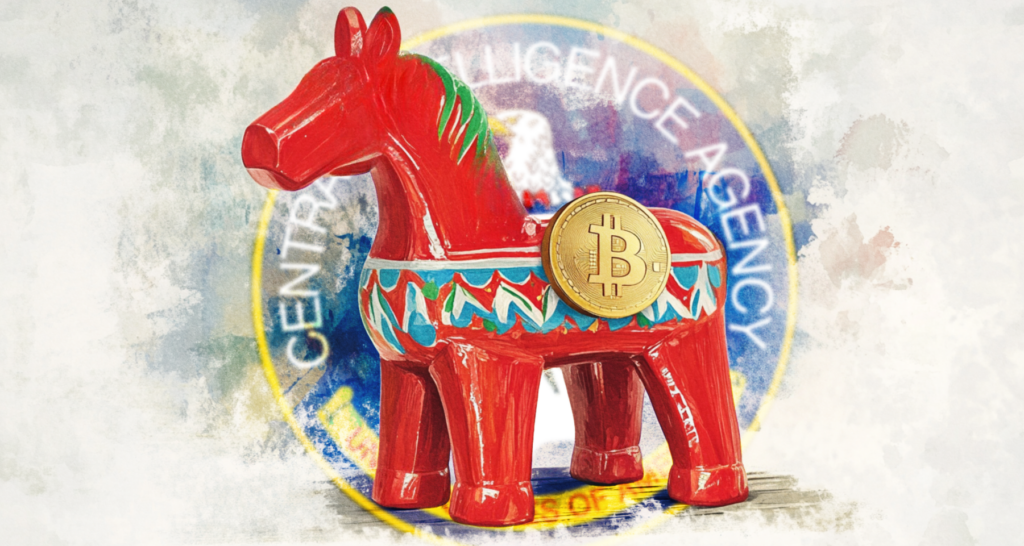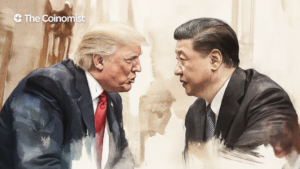“Satoshi is CIA”: Swedish crypto bro opens up about his Bitcoin journey

The first crypto craze took place almost a decade ago. Overnight, many people found out about Bitcoin and its underlying technology, blockchain.
Oh, crypto bros, where are you at?
After crossing the $20,000 mark in 2017, hundreds of thousands of people worldwide started taking interest in the burgeoning technology and its impact on the world.
Almost a decade later, Bitcoin is still going strong. But is the crypto crowd the same?
The Coinomist decided to explore the subject by interviewing the ‘original’ crypto bros who joined the craze. Here’s the first in a series of interviews that we’ll be looking to publish.
Our first crypto bro Christoffer L. is from Sweden. After falling in love with crypto, his journey ultimately ended in disillusion, with him floating the idea that Satoshi Nakamoto is, in fact, the Central Intelligence Agency. Here’s his journey.
The Coinomist: Why did you join the crypto crowd?
Crypto bro 1: I believe it was such a big hype at the time, and all the cool guys were getting into crypto, trading, making money. Everyone had like one goal in mind, that is the lambo, right? This must have been 2016 or 2017, and all the memes were floating around. That's probably why I got caught up in the hype.
The Coinomist: And what exactly did you do? Did you trade?
Crypto bro 1: I traded. I bought some Bitcoin in early 2017, and that was my first purchase. It was around $100. I wouldn’t call myself a trader or a day trader. I thought of it more as a fun investment, basically.
The Coinomist: What about its technological aspect?
Crypto bro 1: Yeah, that was also another reason why I got into it. I’ve been interested in IT and computers ever since I was a kid. And I believe that probably equates to 50% of why I got into crypto because blockchain technology was new. That was definitely a big part of it.
The Coinomist: What about now? How has your relationship with Bitcoin and crypto in general evolved over the years?
Crypto bro 1: If we start from the beginning, it was like a new technology at the time.
I read a lot about the different projects that handled this verification process in different ways, either proof-of-work or proof-of-stake. So that was very interesting. Also, the fact that it was anonymous, right? In the sense that the transactions are anonymous. So if you're into crypto, you're basically pointing the middle finger at any government or establishment. In the beginning, it was very cool that it was so anonymous, and nobody really knew for sure who created it. This ‘Satoshi’ is still very mysterious.
But over the years, I believe I lost interest in it a bit, even though it was actually a very good investment.
The Coinomist: Did you make money off of it?
Crypto bro 1: Sure, I did make a little bit of money, but it was more like fun money. So, I don't even know any numbers anymore. I sold off my last Bitcoins a long time ago now.
Nowadays, when I'm a little bit more mature, I still believe in its technology. From a technological standpoint, I still think it's a very good thing. But I don’t believe it was created by an anonymous guy like a rebel or a group of people. It's most likely created by some sort of government.
The Coinomist: Which government?
Crypto bro 1: The United States’.
The Coinomist: Why?
Crypto bro 1: Because think for yourself. This story about the Silk Road in the US – they obviously tracked all the transactions on that platform using Bitcoin. They seized a lot of the Bitcoins going through the platform.
If you look to the east of the United States or in Europe, for instance, Interpol, they also had several fun little campaigns where they actually created encrypted messaging platforms and apps that criminals use. They infiltrated criminal organizations and pushed this encrypted app that was supposed to be so cool and good.
It turned out that, all along, Interpol and the police could read every single message on the platform. I believe that there’s a huge agenda or incentive behind creating this blockchain technology, specifically Bitcoin.
The Coinomist: Bitcoin transactions are often considered pseudonymous rather than truly anonymous. What about privacy coins? Do you think that they were also created by the government?
Crypto bro 1: No, I like privacy coins like Monero and some others I know of.
Obviously, they’re not created by a government because that defeats the entire purpose. Many people on the Silk Road also used coin mixers. Basically, you put in $100, and you get $99 back but from a different address.
Probably, Bitcoin was pushed very hard through word-of-mouth marketing in the beginning, created by the CIA or someone similar.
Nowadays I don't even know how many cryptos there are. Like a couple of thousands, 3000. I don't even know. I'm not checking Coinmarketcap anymore, but I used to, and it was well over 2000 the last time I checked it.
The Coinomist: Are you upset that you sold off your Bitcoin, given that it surpassed the $100,000 mark not that long ago?
Crypto bro 1: I mean, yeah, sure. At the same time, you can’t think in those terms. You can't go your entire life mulling over “what ifs”. For example, what if I had invested in Nvidia a couple of years ago? There is always some alternative cost to everything you do, right? So instead of buying that cup of coffee when you're out for a walk for $5, you can invest it in something else, right?
So, I wouldn't say that I'm upset that I sold. I’m glad I joined that early, but yeah sure, it would be nice to have even more money right now.
The Coinomist: You also authored some articles about cryptocurrencies?
Crypto bro 1: Yes, I did. I believe that was back in 2017–2018. It was the Altcoinbuzz community. I wrote for them for probably a year and a half. It was actually fun to discover new topics throughout this entire crypto space. Every single week, reading about new coins and just be up to date on what's going on throughout the entire community.
The Coinomist: And politically, do you tend to lean to the right or the left?
Crypto bro 1: To the right.
The Coinomist: Are you also anti-establishment. After all, you mentioned at the beginning that “the crypto community showed the middle finger to the establishment”?
Crypto bro 1: Yes, I'm right, and yes, I don't like any type of governance. I’m more of a Libertarian, something along those lines. I believe that it's every man for himself. I believe in capitalism, not in socialism.
The Coinomist: Do you like contemporary America?
Crypto bro 1: I mean, there are a lot of good and bad things. I'm not that into politics per se, but I do believe that America is a very good country for innovation. Just look at all the technological development over the past 100 years or 200 years.
Pretty much all the major innovations are coming from America.
The Coinomist: Final thoughts?
Crypto bro 1: I believe that these days there is a lot of fraud going on in the crypto market. Nowadays it's very easy to create your own crypto, and then it's just a matter of pushing that to an audience if you’re a TikToker, YouTuber, or whatever, it’s very easy to create this coin. That’s basically what happened.
The latest and greatest example is this Hawk Tuah girl and all this crypto pump and dump. So, I read the news but I'm not that into crypto anymore.
The Coinomist: You’re talking about memecoins?
Crypto bro 1: Yeah, there are around 2000 memecoins and only one original coin that was designed basically to keep track of all the payments and transactions.
The Coinomist: And that is Bitcoin, right?
Crypto bro 1: And that is Bitcoin, which was probably created with that purpose in mind.
The Coinomist: Since we're on the subject. We’ve only talked about Bitcoin, but what do you think about it, let's say, its ‘chief competitor,’ Ethereum?
Crypto bro 1: I mean, it is totally different. It’s proof-of-stake. I don't know that much about Ethereum but I do know that they’re two different technologies, and there are many other coins and apps built on top of the Ethereum platform.
I stopped following that project a few years ago. Every coin, fork, branch, and everything else is evolving at a very rapid pace, right?
I think I read the other week that some people are afraid that a new Bitcoin fork from MicroStrategy will occur in the US or they are trying to take control of that new fork. So that is also a big risk. Like I said, I read some news but I'm not that into crypto anymore.
The content on The Coinomist is for informational purposes only and should not be interpreted as financial advice. While we strive to provide accurate and up-to-date information, we do not guarantee the accuracy, completeness, or reliability of any content. Neither we accept liability for any errors or omissions in the information provided or for any financial losses incurred as a result of relying on this information. Actions based on this content are at your own risk. Always do your own research and consult a professional. See our Terms, Privacy Policy, and Disclaimers for more details.


























